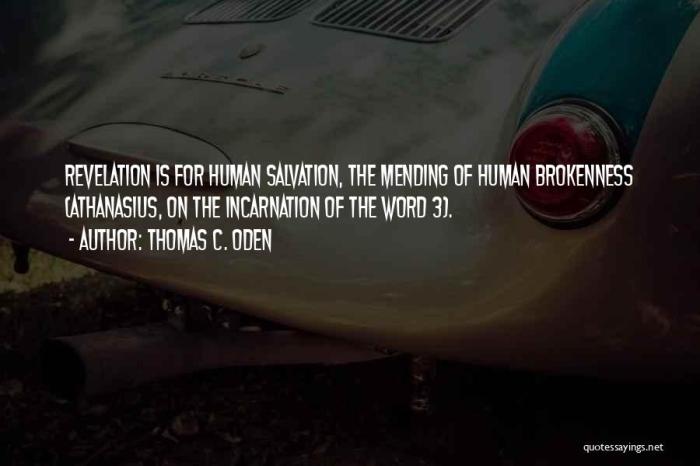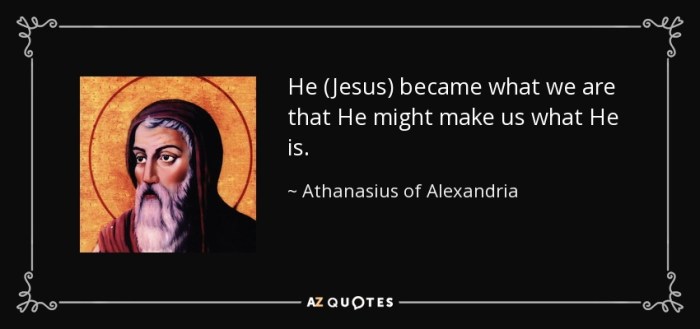Athanasius on the incarnation quotes – Athanasius on the Incarnation: A Theological Exploration delves into the profound teachings of Athanasius, a pivotal figure in Christian history, on the Incarnation of Jesus Christ. Athanasius’s writings provide invaluable insights into the nature of God, the relationship between the divine and human, and the significance of Christ’s Incarnation for humanity’s salvation.
This comprehensive analysis explores Athanasius’s understanding of the Logos, the purpose and implications of the Incarnation, and its historical and theological context. Through a rigorous examination of Athanasius’s writings, we gain a deeper understanding of the complexities of Christian doctrine and its enduring relevance for contemporary theology.
Athanasius on the Incarnation

Athanasius, a fourth-century bishop of Alexandria, is renowned for his influential teachings on the Incarnation. He argued that the Incarnation, the union of the divine and human natures in the person of Jesus Christ, was essential for the salvation of humanity.
According to Athanasius, the Incarnation was a necessary consequence of God’s love for humanity. God created humanity in his own image and likeness, but sin corrupted human nature and separated humanity from God. The Incarnation was God’s way of bridging the gap between humanity and God and restoring humanity to its original state of communion with God.
Significance of the Incarnation in Athanasius’s Theology
The Incarnation was central to Athanasius’s theology. He believed that the Incarnation revealed the true nature of God as a God of love and compassion. It also revealed the true nature of humanity as created in the image of God.
The Incarnation was a source of hope for humanity, demonstrating that God had not abandoned humanity to its fate but was actively working to restore humanity to its former glory.
The Logos and the Incarnation

For Athanasius, the Logos is the eternal and uncreated Son of God, who is co-equal and co-eternal with the Father. In the Incarnation, the Logos took on human flesh and became the God-man, Jesus Christ. This event was necessary for the salvation of humanity, as it allowed the Logos to bridge the gap between God and man and to make possible the redemption of sin.
The Role of the Logos in the Incarnation
The Logos played a central role in Athanasius’s understanding of the Incarnation. He believed that the Logos was the only one who could have become incarnate, as he was the only one who was both fully God and fully human.
The Logos was able to take on human flesh without losing his divinity, and he was able to live a perfect life and die a sacrificial death for the sins of humanity.
The Relationship between the Logos and the Human Nature of Christ
Athanasius believed that the Logos and the human nature of Christ were united in a single person, Jesus Christ. This union was not a mixture of two natures, but rather a union of two natures in one person. The Logos did not become human, and the human nature of Christ did not become divine.
Rather, the two natures were united in a single person, Jesus Christ, who was both fully God and fully human.
The Purpose of the Incarnation

Athanasius believed that the Incarnation was essential for God’s purposes of salvation and restoration. He identified several primary reasons for the Incarnation:
To Overcome Sin and Death
According to Athanasius, the Incarnation was necessary to overcome the power of sin and death that had entered the world through Adam’s fall. By becoming human, Jesus Christ was able to live a sinless life and offer himself as a perfect sacrifice for the sins of humanity.
Through his death and resurrection, Jesus defeated death and opened the way for eternal life for all who believe in him.
To Restore Humanity to God’s Image, Athanasius on the incarnation quotes
Athanasius also believed that the Incarnation was necessary to restore humanity to God’s image. Through sin, humanity had become corrupted and alienated from God. By becoming human, Jesus Christ provided a model of perfect humanity and showed us how to live in communion with God.
Through his grace, we can be transformed and restored to the image of God.
To Reconcile Humanity with God
Finally, Athanasius believed that the Incarnation was necessary to reconcile humanity with God. Sin had created a barrier between God and humanity, but through Jesus Christ, that barrier has been broken down. By accepting Jesus as our Savior, we can be reconciled with God and enter into a personal relationship with him.
The Implications of the Incarnation

The Incarnation, the belief that God became human in the person of Jesus Christ, has profound implications for human nature and our understanding of salvation.
For Human Nature
The Incarnation affirms the inherent value and dignity of human beings. By taking on human flesh, God not only redeems humanity from sin but also elevates our nature to a new level of existence. We are now capable of sharing in the divine life and becoming partakers of God’s grace.
For Salvation
The Incarnation is central to our understanding of salvation. Through the life, death, and resurrection of Jesus Christ, we are reconciled to God and granted forgiveness of sins. The Incarnation makes it possible for us to experience eternal life and communion with God.
Historical and Theological Context: Athanasius On The Incarnation Quotes

The Arian controversy was a significant theological dispute that arose in the 4th century within the early Christian Church. The controversy centered around the nature of Jesus Christ and his relationship with God the Father. The main proponent of Arianism was Arius, a presbyter from Alexandria, who argued that Jesus was a created being, subordinate to God the Father, and not co-eternal with Him.
Significance of Athanasius’s Writings
Athanasius, the Bishop of Alexandria, emerged as a staunch opponent of Arianism. His writings, particularly his treatise “On the Incarnation,” played a crucial role in shaping the orthodox understanding of the Trinity and the nature of Christ. Athanasius argued that Jesus was not created but was eternally begotten of the Father, fully divine and co-eternal with Him.
- Athanasius’s writings provided a systematic and comprehensive refutation of Arianism, establishing the orthodox doctrine of the Trinity.
- His emphasis on the unity and equality of the Father, Son, and Holy Spirit became foundational for subsequent Christian theology.
- Athanasius’s writings contributed to the formulation of the Nicene Creed, which affirmed the divinity of Christ and condemned Arianism.
Influence and Legacy

Athanasius’s teachings had a profound influence on the development of Christian doctrine, particularly in the areas of Christology and Trinitarian theology.
His emphasis on the full divinity of Christ and the consubstantiality of the Son with the Father became central tenets of Christian orthodoxy. The Council of Chalcedon (451), which condemned Nestorianism and affirmed the hypostatic union of the two natures in Christ, drew heavily on Athanasius’s writings.
Ongoing Relevance
Athanasius’s writings continue to be relevant for contemporary theology. His emphasis on the incarnation as a revelation of God’s love and grace resonates with modern theologians seeking to articulate a credible and meaningful understanding of God.
His insights into the relationship between God and humanity also provide a valuable resource for theologians exploring the nature of human existence and the possibility of salvation.
FAQ Summary
What is the significance of the Incarnation in Athanasius’s theology?
For Athanasius, the Incarnation is the central event in salvation history, through which God becomes fully human in order to redeem humanity from sin and death.
How does Athanasius understand the relationship between the Logos and the human nature of Christ?
Athanasius affirms the unity of the divine and human natures in Christ, emphasizing that the Logos fully assumed human nature without diminishing its divinity.
What are the primary reasons for the Incarnation according to Athanasius?
Athanasius identifies several reasons for the Incarnation, including the redemption of humanity from sin, the restoration of the divine image in humans, and the defeat of death.